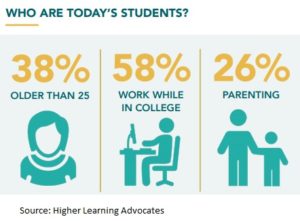 While most people think of the typical college student as coming directly from high school, the reality is that 38 percent of college students today are 25 or older. On July 9, Higher Learning Advocates organized a panel titled Pathways to Success: Supporting Today’s Adult Students to discuss the unique challenges adult learners face in postsecondary education and potential solutions.
While most people think of the typical college student as coming directly from high school, the reality is that 38 percent of college students today are 25 or older. On July 9, Higher Learning Advocates organized a panel titled Pathways to Success: Supporting Today’s Adult Students to discuss the unique challenges adult learners face in postsecondary education and potential solutions.
The panel included:
- Goldie Blumenstyk, Senior Writer for The Chronicle of Higher Education
- Stephanie Shaw, Executive Director of Eastern Ohio Education Partnership
- Maureen Elias, Veteran Student
- Chris Bustamante, Bustamante Consulting, Arizona
- Eric Bing, CEO of The College of Healthcare Professions, Texas
Many high school graduates enter the workforce directly instead of pursuing postsecondary education, and with today’s tight labor market, many can find high-wage employment without an advanced degree. However, as industries change and labor markets shift, workers will need additional, more specialized skills to stay competitive. Programs like the Eastern Ohio Education Partnership help adults obtain degrees and certifications so they can advance in the workforce and sustain high-wage, high-skill and in-demand employment.
Entering postsecondary education as an adult comes with challenges. One of Elias’s biggest concerns as a mother was access to not only affordable childcare, but childcare offered at times after the normal work day to accommodate her night classes. She is not alone: 26 percent of adult students are parents, and access to childcare makes it difficult to finish a degree or certification. Schedule flexibility is important even for adult students without children, as over half work while in college.
So what can be done to better address the needs of adult learners? Postsecondary institutions and policymakers can create flexibility in financial aid to allow more adults to afford education. This option is part of the reason The College of Healthcare Professions is able to educate so many adult learners. Universities can also address the needs of adult learners by accepting transfer credits earned at a previous institution toward a degree or certificate. Beyond these institutional changes, there are ways to make adult students feel more included on campus with small adjustments. Making campuses feel more family friendly is a great way to get adult students integrated. This can be as simple as encouraging members to bring their family along to events hosted by different student organizations.
One of Elias’s core suggestions was mandatory career advising for students who receive any money from the federal government. This ensures students know what courses they need to take in order to graduate on time with their intended major and that federal dollars support individuals who will be career ready when they graduate. Understanding the challenges adult students face today creates space to develop solutions for a better experience in higher education.
Jordan Dreisbach, Policy Intern


 State Name: Kansas
State Name: Kansas